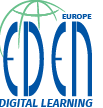
- This event has passed.
Budapest
February 26, 2011 @ 00:00
Learning and (e)-valuation in integrated E-learning settings
E-learning increasingly becomes the inevitable form of creating, acquiring and transmitting knowledge. In the field of assessing student performance, evaluating the quality of teaching, judging the value of a digital educational solution, research has recently been intensive and successful. For many e-learning programs however, methods of assessment remain traditional. Accreditation of online courses may be difficult because evaluation methods are not fitted to the e-learning context.
The real value of e-learning, which is questioned for different reasons in different contexts, may be boosted by credible and appropriate evaluation methods and practices.
In the context of assessment, the quality dimension is emerging as contribution to the valuation of ICT supported learning, its re-positioning by better evaluation methods. The quest for added value how can contribute the new forms of learning, in circumstances of hard socio-economic challenges is strongly coming forward.
The challenge of quality in peer-produced eLearning content
New approaches for new ways of evaluation, instead of basic ones are becoming apparent in the web 2.0 social networking dominated environments. The impact of peer-to-peer networks on the Internet is evolving. Peer production and user-created content are becoming important elements as learners are no longer just consumers, but they actively participate in the process and influence it. Producers and consumers (prosumers) of the learning content are working together on the peer-assessment. The market is becoming a forum for conversation and interactions. Management and facilitation of this dialogue is crucial in the value creation process.
When we evaluate user generated content, quality may be both the result of the interplay between peer production and peer validation processes of digital content.
The issue of transparency, together with credibility is high on the agenda. Sensitive and prospective territories within this field are the convincing assessment and evaluation of the diversity of personal learning environments (PLE), the workplace learning, competence based assessment, media development, e-portfolios and the accreditation of informal learning.
Online adaptive testing in the classroom and the workplace
Evaluation of skills and competences are in the foreground of educational innovation. Traditional instruments are becoming however inadequate because of lower efficiency and as they hardly offer authentic testing situations.
Online assessment techniques are among the hot topics in educational research, as they provide opportunity to assess skills and competences in the context they occur. Tools include the assessment of open-ended questions, essays, drawing and design tasks. Tests may include animation, simulation and a responsive to user needs selection of items of different difficulty level.
